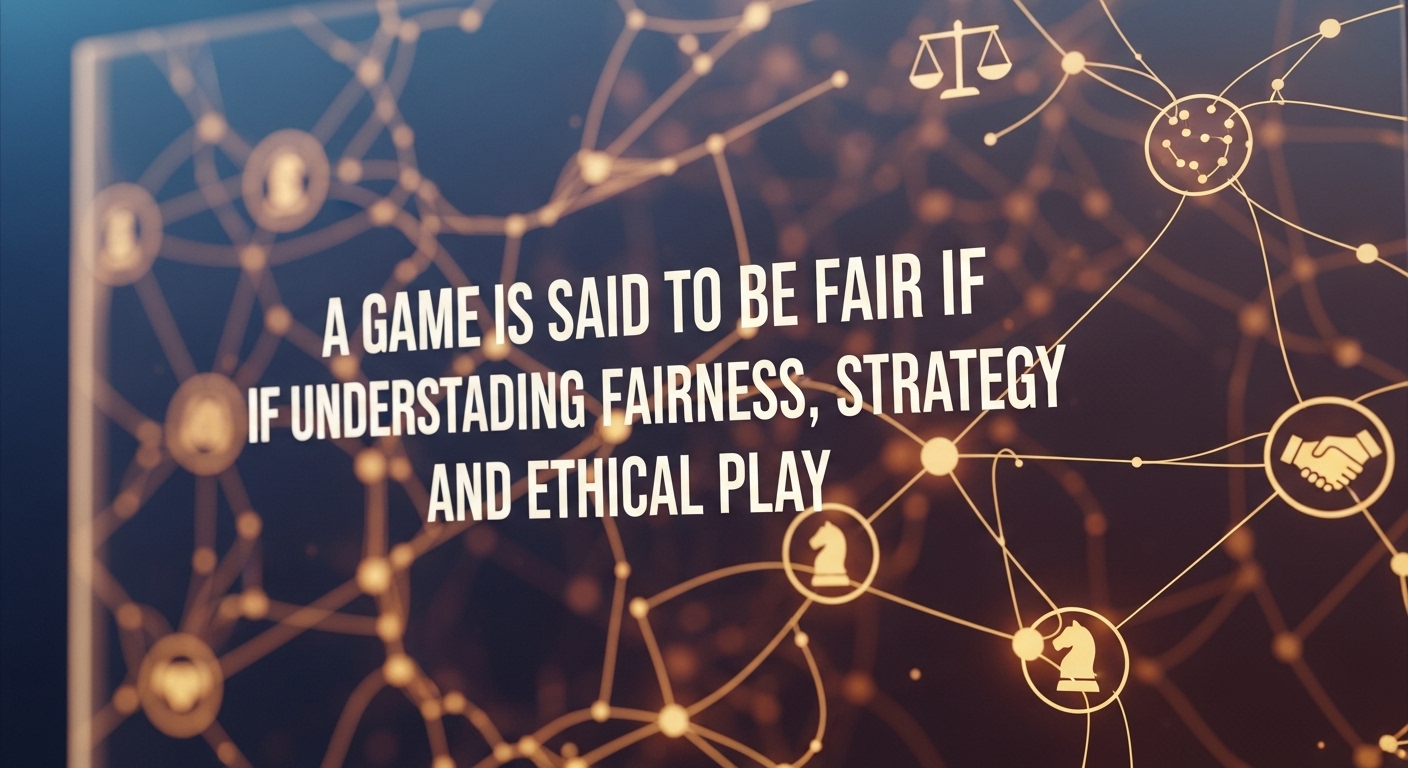In today’s complex world, fairness is a principle that extends far beyond ethics and into the fields of mathematics, economics, and game theory. When analyzing games—whether in sports, board games, or probabilistic models—the concept of equity is central. Simply put, a game is said to be fair if all participants have an equal chance of winning under the rules, and no player is systematically advantaged or disadvantaged.
Understanding fairness in games is not only a matter of theoretical interest; it has practical applications in education, strategy development, gambling regulation, and even artificial intelligence. This article explores what makes a game fair, how fairness is measured, and why it is crucial for trust, engagement, and decision-making.
Defining Fairness in Games
The phrase “a game is said to be fair if” encapsulates a principle rooted in equality and predictability. In essence, a fair game is one in which:
-
All players face equal conditions: No participant is given an unfair advantage.
-
Outcomes are based on rules and skill: The structure of the game ensures that chance or strategy—not bias—determines results.
-
Expected value is balanced: In probabilistic terms, the average gain or loss over repeated plays is zero for all participants.
This definition is widely used in game theory, probability, and statistics, forming the foundation of how mathematicians and economists model competitive interactions.
Fairness in Probability and Game Theory
In probability, the fairness of a game is often expressed in terms of expected value. For example, consider a simple coin toss:
-
If a player wins $10 on heads and loses $10 on tails, the game is fair because the expected value is zero.
-
If the payout were skewed—$15 for heads but $10 loss for tails—the game would favor the player and no longer be fair.
This principle extends to more complex games like lotteries, board games, and card games, where fairness ensures that skill, decision-making, and chance interact in predictable and equitable ways.
Why Fairness Matters
Fairness is not just a theoretical concept—it is critical for trust, engagement, and ethical standards. When participants perceive a game as fair:
-
They are more likely to engage and invest effort.
-
The game fosters learning, strategy development, and skill improvement.
-
Ethical standards are reinforced, promoting equity and respect among participants.
In competitive sports, digital gaming, and educational simulations, perceived fairness enhances the overall experience, maintaining participation and interest.
Examples of Fair and Unfair Games
Fair Games
-
Coin Tosses: A classic example where probability is evenly distributed.
-
Board Games with Balanced Rules: Games like chess or checkers provide symmetrical starting positions.
-
Randomized Educational Games: Classroom exercises where all students have equal chances to answer questions or earn points.
Unfair Games
-
Loaded Dice or Biased Cards: Tools that favor one participant over others.
-
Skewed Game Mechanics in Video Games: Levels designed to benefit certain players based on prior purchases or experience.
-
Biased Rules in Social Games: Rules that favor specific participants or groups systematically.
By identifying fairness and its absence, designers, educators, and regulators can ensure that games serve their intended purpose.
Fairness and Strategy
Understanding fairness is also essential for developing strategy. In a fair game, players know that:
-
Success depends on skill, analysis, and probability rather than external biases.
-
Risk and reward can be calculated realistically.
-
Repeated play offers predictable long-term outcomes.
This clarity allows players to hone decision-making skills, develop contingency plans, and adapt strategies based on probability rather than arbitrary advantages.
Digital Games and Fairness
In modern digital gaming, fairness has become a crucial design principle. Developers use algorithms to ensure:
-
Randomized but balanced outcomes: Loot boxes, randomized challenges, and AI opponents must not favor certain players.
-
Equal opportunity progression: Players with different skill levels should have fair chances to succeed.
-
Transparency in mechanics: Fairness is communicated through clear rules and predictable outcomes.
The digital context demonstrates that fairness is not only ethical but also critical for user retention and satisfaction.
Fairness in Education and Learning Games
Beyond entertainment, fairness in games also plays a vital role in education:
-
Classroom Competitions: Quizzes or team activities are designed to provide all students with equal opportunity to participate and succeed.
-
Gamified Learning Platforms: Online educational games employ balanced mechanics to reinforce learning without bias.
-
Skill Assessment: Fair games can be used to measure performance objectively, helping educators identify areas for improvement.
Capitalizing on fairness ensures that learning outcomes are equitable and meaningful, fostering motivation and skill acquisition.
Challenges in Ensuring Fairness
Despite its importance, ensuring a game is fair presents challenges:
-
Unconscious Bias: Rules or mechanics may unintentionally favor certain participants.
-
Technological Limitations: Randomization algorithms in digital games may sometimes produce imbalances.
-
Human Influence: In sports or social games, refereeing or judging can introduce subjective unfairness.
Addressing these challenges requires constant review, testing, and adaptation to maintain equity and trust among participants.
Fairness Beyond the Game
Interestingly, the concept of fairness in games translates into real-world ethics and decision-making:
-
Economic Models: Fair trading and investment games simulate market behavior.
-
Negotiation and Conflict Resolution: Structured games can help participants understand equity, risk, and compromise.
-
AI and Machine Learning: Fairness principles guide the design of algorithms to prevent bias in automated decision-making.
Thus, the principle that “a game is said to be fair if” extends far beyond entertainment—it informs broader societal and professional practices.
The Future of Fair Games
As gaming and educational platforms evolve, the future of fairness will involve:
-
Enhanced AI Monitoring: Ensuring balanced outcomes and reducing bias in digital platforms.
-
Personalized Fairness: Adapting difficulty to individual skill levels while maintaining equitable chances.
-
Global Standards: Defining fairness in competitive esports, professional tournaments, and educational assessments.
-
Ethical Game Design: Prioritizing transparency, accessibility, and equity in all game mechanics.
These innovations promise a world where games are not only fun but educational, strategic, and ethically grounded.
Conclusion
The phrase “a game is said to be fair if” is more than a simple definition—it represents a principle that underpins trust, engagement, and ethical behavior across education, sports, and professional settings.
By ensuring equality of opportunity, predictability of outcomes, and transparency in rules, fair games empower players to focus on skill, strategy, and learning rather than bias or arbitrary advantage.
Whether in the classroom, on the sports field, or in digital arenas, fairness enhances participation, builds confidence, and fosters meaningful experiences. In a world increasingly aware of equity and ethical standards, the concept of a fair game remains a cornerstone not only of play but of responsible, informed, and strategic decision-making.

